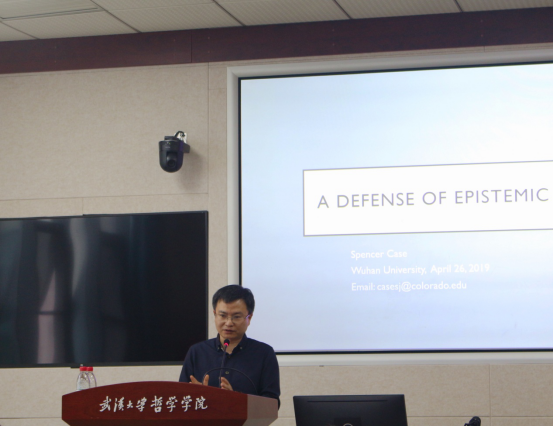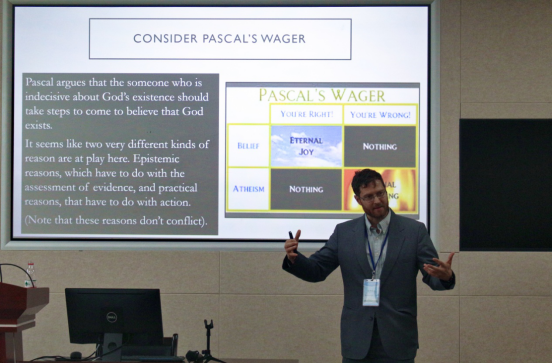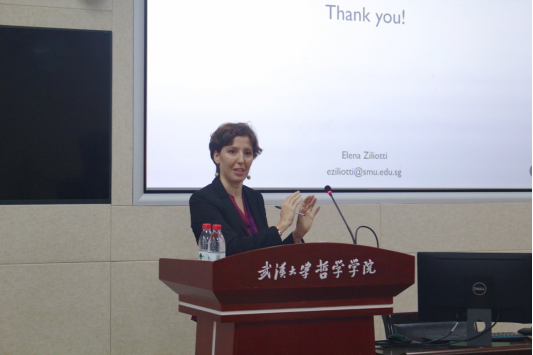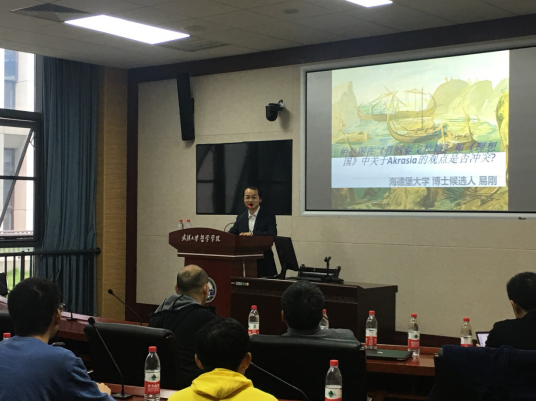From April 27 to 28, 2019, The 6th Wuhan University International Forum for Interdisciplinary Sciences and Engineering was held successfully. Through organizing a series of activities such as academic reports, expert discussions and on-campus visits, School of Philosophy has provided opportunities and platforms for young overseas talents to have a deeper understanding of the development of schools, colleges and disciplines.
In the afternoon of April 27, the seminar of the sub-forum of School of Philosophy was officially opened in the B214 lecture hall of Zhenhua Building. It was co-chaired by Professor Li Yong and Professor Chen Jiangjin. The Forum opened with a concise but passionate speech by Secretary of the Committee, Dr. Long Tao, who used the three keywords of "welcome, thanks and expectation" to expressed his joy at the gathering of overseas talents and his expectation of recruiting talents. After that, Dr. Spencer Case from the University of Colorado, Dr. Elena Ziliotti from the National University of Singapore, Dr. Yi Gang from Heidelberg University, Germany, and Dr. Zheng Mufan from University College of London made scientific, rigorous and interesting reports on the key points and innovations in their respective research fields.
Dr. Spencer Case defends Epistemic Moralism. The thesis argues that that all epistemic normativity is reducible to moral normativity. In another way, there is no domain of ‘epistemic normativity’ distinct from the “ethics of belief,” as defended by W.K. Clifford in his famous essay of that title. He provides some examples of epistemically unjustified beliefs. Thus, by inference to the best explanation, we should accept Epistemic Moralism.

Dr. Elena Ziliotti defends practices of political meritocracy based on a fundamental western value, the concept of equality. She argues that political meritocracy is the expression of a principle of substantive equality of political opportunity and, as such, it competes on an equal footing with another interpretation of this principle, namely democratic equality of fair opportunity. A concern for equality does not entail unconditional support for political meritocracy, but it suggests that society has a reason to promote or select future politicians according to their merits if this provides better outcomes. The relevance of this research is twofold: in relation to contemporary Confucian political theory, the analysis of political meritocracy from an egalitarian standpoint offers a richer understanding of ‘political meritocracy’; with regard to Western democratic theory, it shows that ‘political meritocracy’ is a coherent view worth considering.

The lecture of Dr. Yi Gang investigates the problem of Akrasia (i.e. incontinence or weakness of the will) in Plato’s Protagoras and Republic. The crucial problem is whether Plato advocates conflict views about Akrasia in these two dialogues. To resolve this problem, he tries to answer five questions: 1. Why should I investigate this problem? 2. What’s the meaning of the concept of the Akrasia? 3. What’s the conflict between Plato’s views about Akrasia in the Protagoras and the Republic? 4. Is the view that Plato’s views about Akrasia in these dialogues do not conflict with each other reasonable? 5. What is my resolution to this problem?

Dr. Zheng Mufan started her report with the word "power" as the core. She maintained that power consistently elicited rule-based moral reasoning under regulation-centered organizations. In contrast, power triggered outcome-based reasoning under person-centered organizations. Desire for authority and goal commitment mediated the interactive effects of power and context on moral reasoning. These findings are consistent with the situated focus theory of power, showing that the links between power and morality are flexible, context sensitive and mediated by a greater commitment to active goals. Compared to powerless individuals, power holders possess goal-oriented morality.

The reports of the four scholars are straightforward but profound, which is thought-provoking. The frequent interaction, heated discussion and active atmosphere of the report fully show the charm of interdisciplinary convergence and integration and sparks of thinking collision.
Wuhan University International Forum for Interdisciplinary Sciences and Engineering is providing a platform for prominent young talents at home and abroad to enhance brainstorming and cross-disciplinary exchange, and advance interdisciplinary sciences and collaborative innovation, with the goal of striving for the construction of world-class leading university and disciplines. The forum has already been successfully held for six times, and it has become an important platform for the talent recruitment of Wuhan University.



